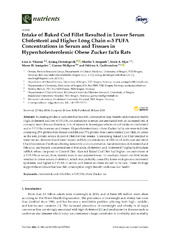Intake of baked cod fillet resulted in lower serum cholesterol and higher long chain n-3 PUFA concentrations in serum and tissues in hypercholesterolemic obese Zucker fa/fa rats
Vikøren, Linn Anja Slåke; Drotningsvik, Aslaug; Bergseth, Marthe Tønder; Mjøs, Svein Are; Austgulen, Maren Hoff; Mellgren, Gunnar; Gudbrandsen, Oddrun Anita
Peer reviewed, Journal article
Published version

Åpne
Permanent lenke
https://hdl.handle.net/1956/19104Utgivelsesdato
2018-06-28Metadata
Vis full innførselSamlinger
Originalversjon
https://doi.org/10.3390/nu10070840Sammendrag
Increasing evidence indicates that lean fish consumption may benefit cardiovascular health. High cholesterol and low n-3 PUFA concentrations in serum are associated with an increased risk of coronary heart disease; therefore, it is of interest to investigate effects of cod intake on cholesterol and n-3 PUFAs in serum and tissues. Hypercholesterolemic obese Zucker fa/fa rats were fed diets containing 25% protein from baked cod fillet and 75% protein from casein (Baked Cod Diet), or casein as the sole protein source (Control Diet) for four weeks. Consuming Baked Cod Diet resulted in lower serum cholesterol and lower hepatic mRNA concentrations of HMG-CoA reductase and sterol O-acyltransferase-2 without affecting serum bile acid concentration, faecal excretion of cholesterol and bile acid, and hepatic concentrations of bile acids, cholesterol and cholesterol 7 alpha-hydroxylase mRNA when compared to Control Diet. Rats fed Baked Cod Diet had higher concentrations of n-3 PUFAs in serum, liver, skeletal muscle and adipose tissue. To conclude, baked cod fillet intake resulted in lower serum cholesterol, which was probably caused by lower endogenous cholesterol synthesis, and higher n-3 PUFA in serum and tissues in obese Zucker fa/fa rats. These findings support the evidence that lean fish consumption might benefit cardiovascular health.
